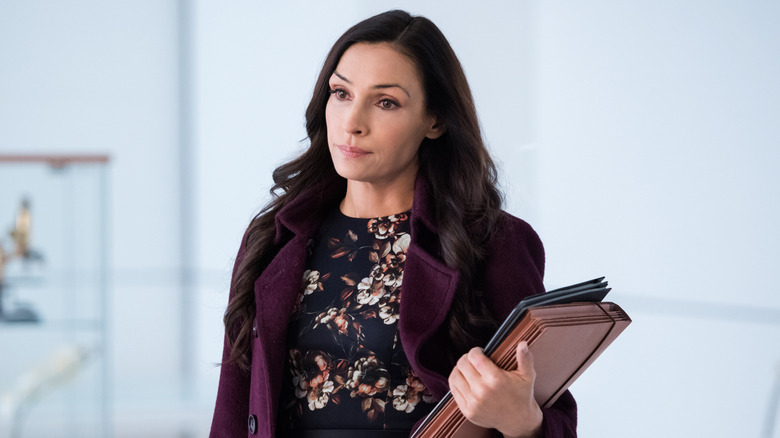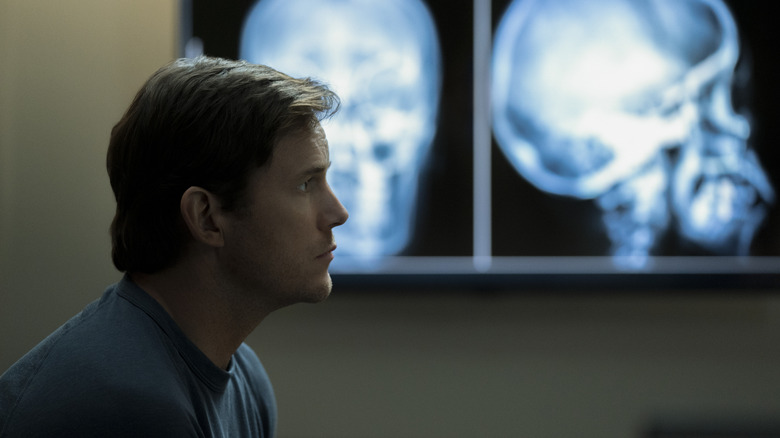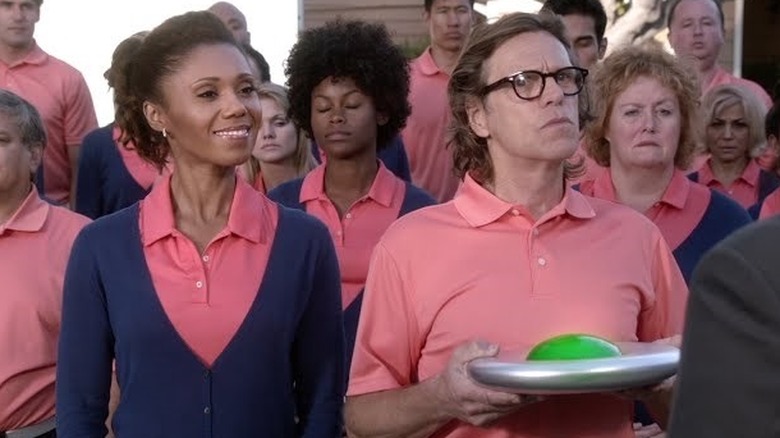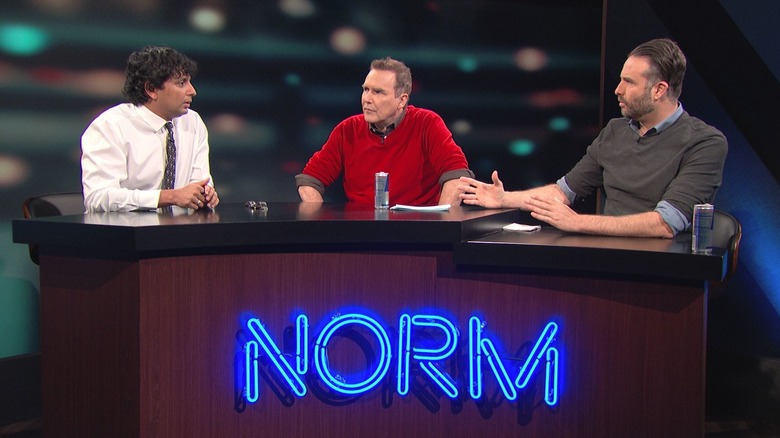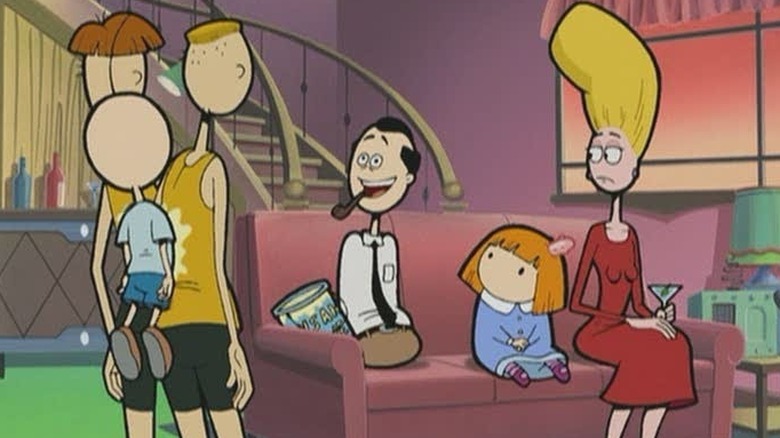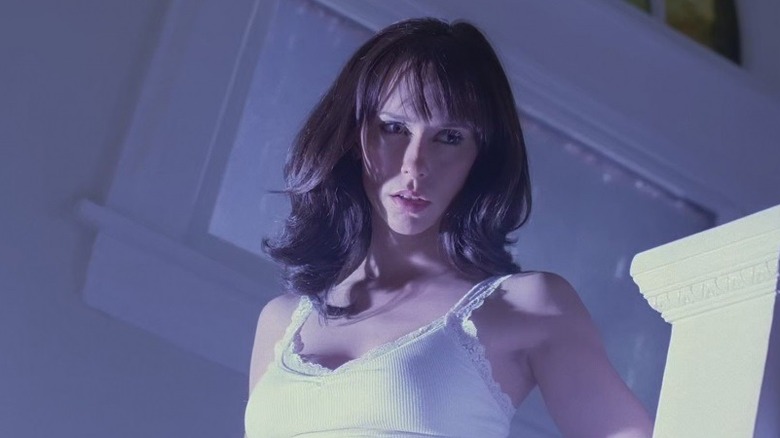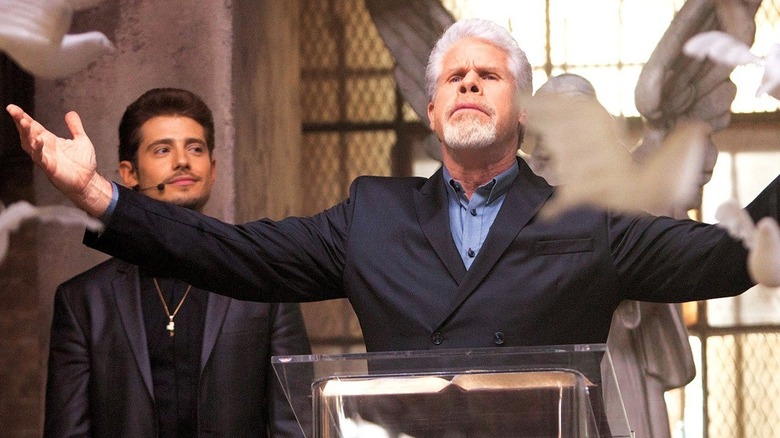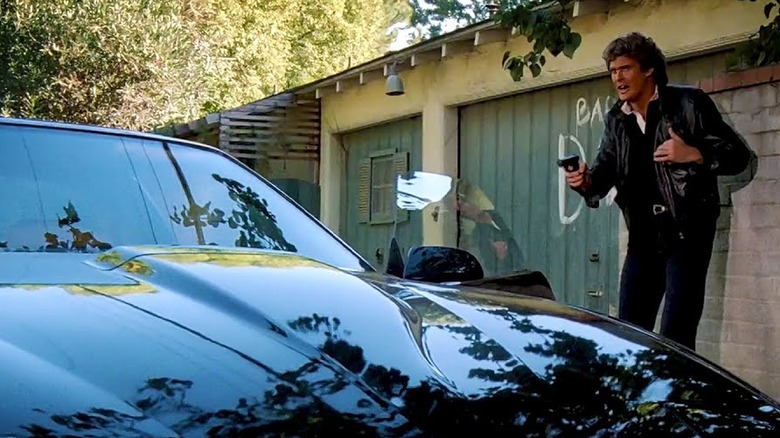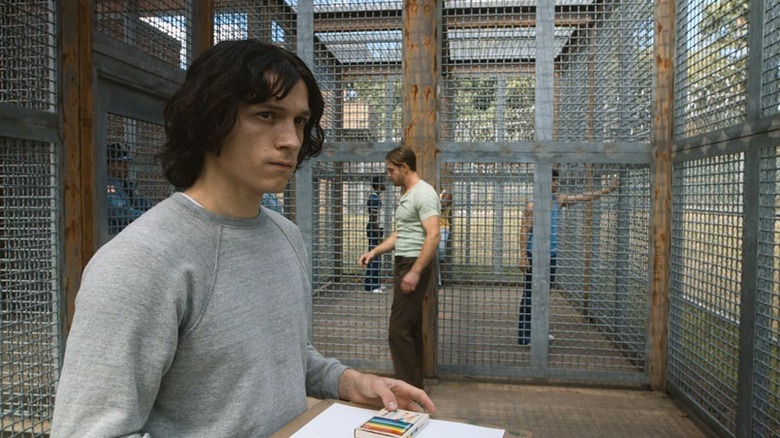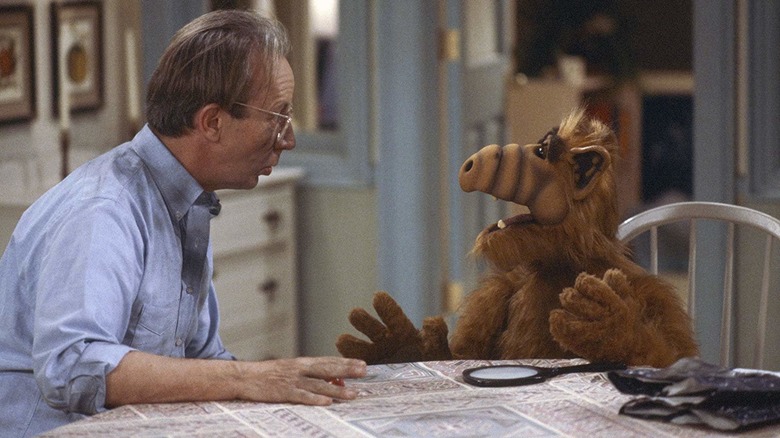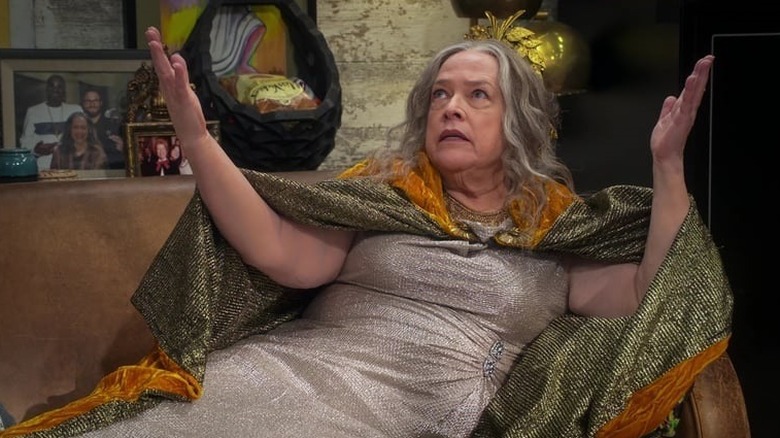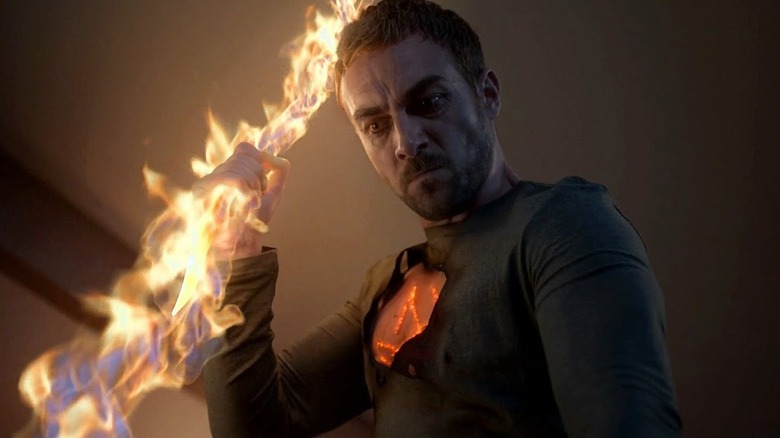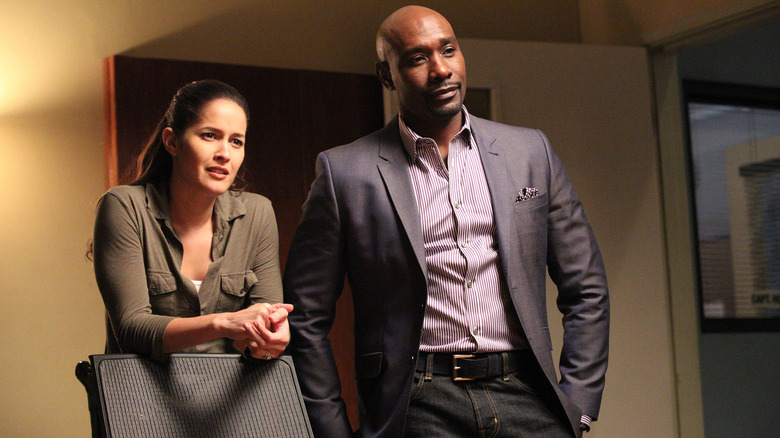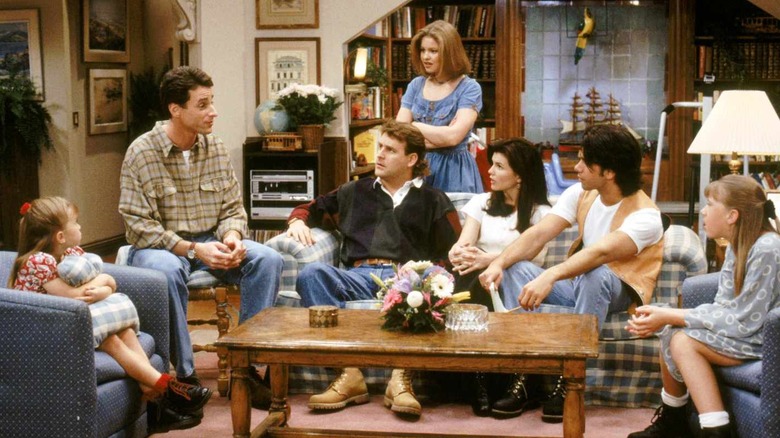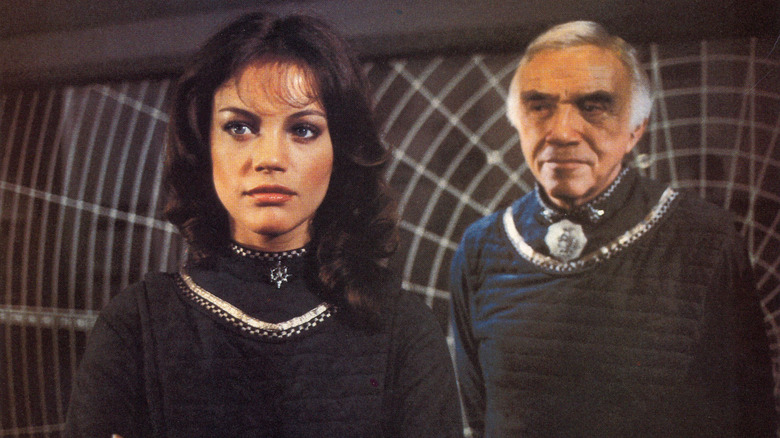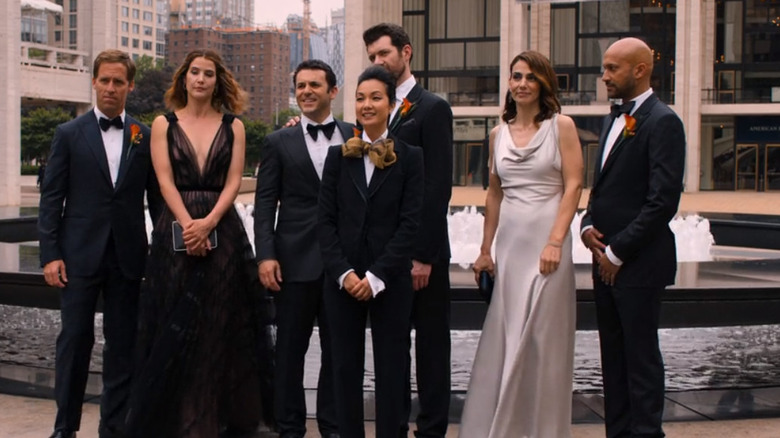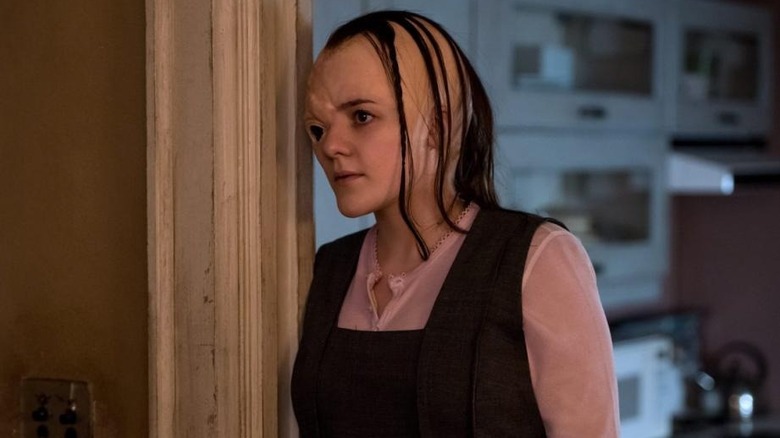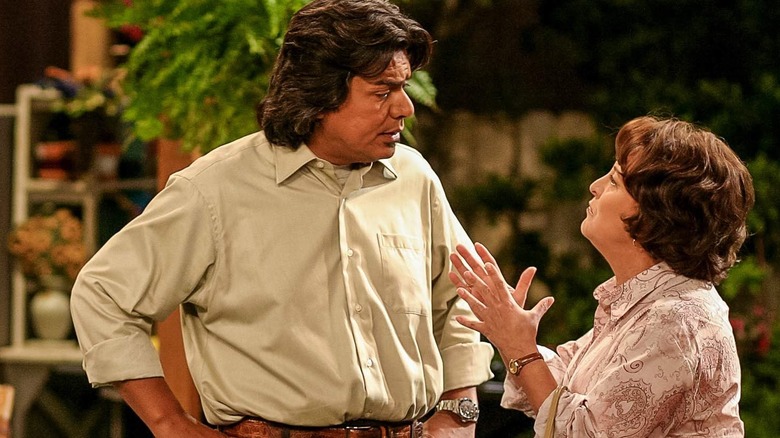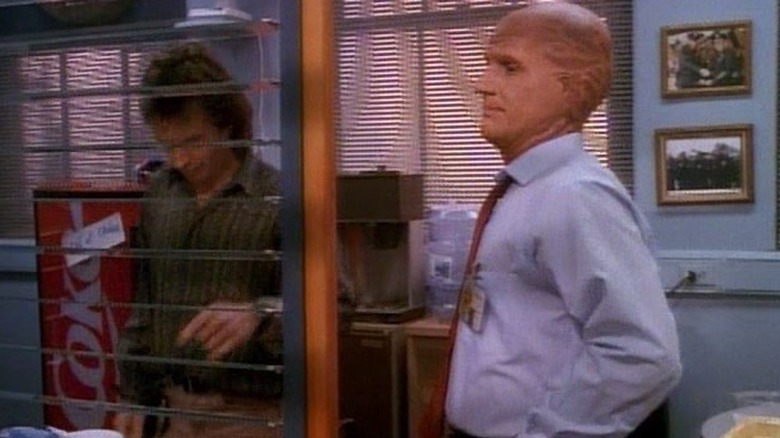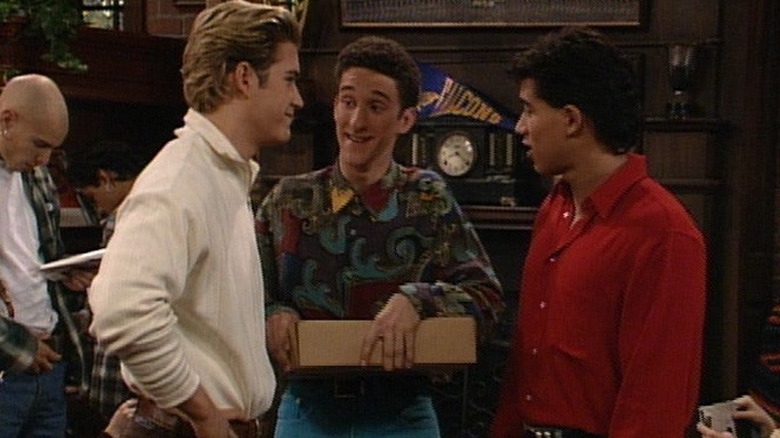Critically-Hated TV Shows That Are Actually Awesome
It's no big secret that critics and audiences don't always see eye to eye. But it's one thing to just slightly disagree — it's another thing entirely for one side to love something and the other to outright despise it. And just like there are a number of critically-hated movies that are actually awesome, viewers often see greatness in TV shows that critics on the whole have panned. All of the shows in this feature have Rotten Tomatoes or Metacritic scores below 50, but have significantly higher audience scores that represent a major gulf between the two consensuses.
One thing that many of these shows have in common is that critics looked for more depth than audiences needed out of the shows, with the latter group content to enjoy some light, breezy entertainment. In other cases, the depth was arguably there, but only the audience seemed to recognize and appreciate that depth. It also needs to be noted that a number of these shows were released a significant amount of time ago, and the critical hatred in question came from the time the shows were released and doesn't necessarily reflect modern reappraisal. That is to say, audiences ended up being correct in the long run — which is quite often the case for both TV and film.
The Terminal List
Despite the fact that Chris Pratt is seemingly in every other movie released these days, he somehow still had time to star in the 2022 Amazon Prime Video action thriller series "The Terminal List." He plays U.S. Navy SEAL James Reece, who is trying to piece together the events that unfolded and the actions he took during a recent covert mission. Suffering memory loss and headaches, he goes to get himself checked out and is attacked. That, coupled with several people in his life turning up dead, sends Reece on a dangerous mission to uncover the conspiracy behind it all.
While critics praised Pratt's performance and the show's high production values, they were mostly down on "The Terminal List," saying it would've been better as a single two-hour movie and complained that it's a boring, cliché-ridden mess. Audiences, on the other hand, completely disagree — with a Rotten Tomatoes Popcornmeter score of 94% to the critics' score of 40%. They love "The Terminal List" for the exciting action set-pieces and the fact that each episode feels like its own Hollywood blockbuster, with many audience reviews specifically calling out how the critics are way off base in their negative assessment of the show. And the ratings match the audience feedback, as "The Terminal List" has been renewed for a forthcoming second season.
The Neighbors
Network television sitcoms were in a pretty dire place in the 2010s, so new ones had to try something radically different to get any sort of attention whatsoever. For "The Neighbors," which debuted on ABC in 2012, that radically different thing was giving the show a sci-fi bent where a human family moves into a gated community only to find that their neighbors are actually aliens disguised as humans. While they initially just seem like regular humans who are a bit quirky — and inexplicably share the names of sports legends like Larry Bird and Jackie Joyner-Kersee — the various ways that the titular neighbors are not of this planet eventually reveal themselves.
Critics weren't sold on "The Neighbors" when it first began, with the initial batch of the reviews of Season 1 equating to a mere 31% on Rotten Tomatoes. It was frequently compared to the somewhat similarly premised "3rd Rock from the Sun," but typically just to point out that "The Neighbors" was far inferior to that acclaimed hit. Audiences, on the other hand, took to "The Neighbors" right away and appreciated its high-concept premise and meta humor, with ratings high enough to score a second season.
For what it's worth, critics did largely come around on the show and were writing more positively about "The Neighbors" as the first season went on and into Season 2, but viewers were on board from day one. Unfortunately, not enough of those viewers followed the show when it moved to Fridays in Season 2, and "The Neighbors" only ever got two seasons.
Norm Macdonald Has a Show
The devastating death of Norm Macdonald in 2021 saw the passing of a true comedic genius — albeit, one who always seemed to have to wait to get the recognition he deserved. His shows, his movies, and his stint on "Saturday Night Live" all seemed to get middling reception at the time but would be much more positively reappraised later on. After that cycle repeated itself over and over again, one would think that critics would eventually realize that maybe they need to take a closer look at Macdonald's work as it was happening rather than needing time to pass before they came around to it.
And yet, when Macdonald landed a talk show on Netflix in 2018 called "Norm Macdonald Has a Show," critics once again lined up to bash it. Tim Goodman of The Hollywood Reporter called the show "pretty terrible," while Caroline Franke of Variety lamented, "Even if the question of how Macdonald got this show is easily answered, the question of why anyone outside he and his diehard fans should bother with it never is." But those diehard fans seemed to find no trouble appreciating the show, with audience scores on all platforms equating to universal acclaim.
Don't be surprised to see think pieces written by critics 10 years from now proclaiming how the reviews for "Norm Macdonald Has a Show" were too low and that it deserved more love in its time — and while Macdonald was still alive to appreciate it.
The Oblongs
For every "The Simpsons," "South Park," "Family Guy," and "King of the Hill" there are about two dozen other primetime animated shows that didn't find their audience and never returned for even a second season. And while most of them failed because they just weren't particularly good, plenty — such as MTV's "Clone High" — had the quality to become long-running hits but just didn't get the ratings they deserved and were relegated to the pantheon of best one-season TV shows.
"The Oblongs" was both a ratings disappointment as well as critically panned when it first ran on the WB in 2001. In fact, the ratings were so dire that the WB didn't even bother airing all of the show's already completed 13 episodes, with Adult Swim picking it up to air the existing eight as well as the five that were previously unaired. To be fair, the premise was pretty dark — Bob Oblong (Will Ferrell) and his family all have various physical disfigurements as a result of exposure to pollution and radiation from the careless wealthy community that lives up the hill from them.
An animated sitcom family whose patriarch has no arms or legs, and who has two sons that are conjoined twins connected at the hip as well as a daughter with an odd growth protruding from her head, were probably a bit much for primetime network television. But the audience that did manage to find it enjoyed it, and the show is now widely considered to be an overlooked gem.
Ghost Whisperer
Season 1 of "Ghost Whisperer" debuted to a paltry 17% on Rotten Tomatoes, with the dire critical consensus stating, "Melodramatic and schmaltzy, 'Ghost Whisperer' traffics in contrived uplift and makes a hash of the rules governing its supernatural universe." Needless to say, they weren't fans of Jennifer Love Hewitt as Melinda Gordon, a medium who tries to balance a normal life with helping spirits deal with unfinished business before fully crossing over to the Great Beyond.
"Ghost Whisperer" ran for five seasons on CBS from 2005 to 2010, clearly connecting with audiences in spite of whatever the critics had to say about it. Among the outlier praise the show managed to get from critics, it was called moving and was commended for being great comfort food for people who enjoy stories about people being able to reconnect with their departed loved ones from beyond the grave. And audience reviews seem to suggest that viewers got exactly that from "Ghost Whisperer": A feel-good show where things typically wrapped up in a satisfying way each episode and provided a nice alternative to all the increasingly gritty and morally complex television of the era.
The fact that cable channels Ion, Syfy, and We were all willing to pay $700,000 per episode for the syndication rerun rights only further proves how much people enjoy watching "Ghost Whisperer" over and over again.
Hand of God
In 2015, Amazon Prime Video made a big push into the world of original content when the fledging streaming service debuted an impressive seven original series. But two of those shows never got a second season, while two more were cancelled after Season 2 — and that latter duo included "Hand of God." The show follows a corrupt judge (Ron Perlman) who has a breakdown after suffering a personal tragedy, at which point he starts to believe that God is instructing him to become a vigilante and joins a religious cult that helps him along this violent new path.
Metacritic culled the reviews of the first season of "Hand of God" to a 44 rating, with critics damning the show for being too dark, too unpleasant, too bleak, and too satisfied with itself for its edgy violence. But the user score paints a very different picture with a 7.2 or "generally favorable" rating, which matches the 85% Popcornmeter score on Rotten Tomatoes. Viewers connected much better to the show's themes and its characters than critics did, and thought that all the grittiness was in service of the story rather than distracting from it. Unfortunately, "Hand of God" only got two seasons, and might've had a better chance to get the run it deserved on a streamer that with a less itchy cancel finger.
Knight Rider
To be fair, "Knight Rider" is pure '80s cheese and critics weren't entirely wrong to call it out for that. David Hasselhoff — who has basically built an entire career out of comfort food television that doesn't win awards but is crowd-pleasing nonetheless — stars as detective Michael Knight who has a self-aware, computer-controlled talking car named KITT (William Daniels) with enough gadgets to put the Batmobile to shame. It's a goofy concept that gave way to equally goofy storylines, and critics were not remotely impressed.
The fact that "Knight Rider" not only lasted for four seasons but went on to spawn multiple TV movies as well several spin-offs — plus a reboot in 2008 — proves that it found a sizable fanbase. And that's to say nothing of all the "Knight Rider" video games, novels, and pop culture references over the 40+ years since the original show debuted. It's a fun show with an incredible theme song that was a treat to watch in its day and remains the perfect time capsule of what was considered "cool" in pop culture in the mid-1980s. No, critics haven't reappraised it and probably never will, but the enduring legacy of "Knight Rider" speaks for itself.
The Crowded Room
Despite an impressive resume that includes some of the biggest and most beloved movies of the 21st century, Tom Holland recommends "The Crowded Room" above all his other work. He's incredibly proud of his performance on the show as Danny Sullivan, a character loosely based on Billy Milligan who became known as The Campus Rapist for crimes he committed in the 1970s. "The Crowded Room" sees Danny in prison as he reflects on his past and how it shaped the troubled man he became.
While critics acknowledge the impressive work done by not only Holland but his co-stars — including Amanda Seyfried, Emmy Rossum, and Sasha Lane — they were far less impressed by "The Crowded Room" as a whole. The Rotten Tomatoes critical consensus states that "the story runs in circles, resulting in an exhausting and often frustrating experience," landing it a 33% rating. But audiences have really come to bat for the show, with over 1,000 audience ratings submitted to the site that give it a 92% Popcornmeter score — a nearly 60-point divide between critics and viewers. Many of the audience reviewers express shock and confusion over the low critic score, with descriptors like "amazing" and "masterpiece" frequently appearing throughout the glowing write-ups.
ALF
It's the type of premise that seems specifically designed to connect with audiences while critics roll their collective eyes — a puppet portrays an alien that has crash landed in suburbia and comes to live with a mild-mannered family who try to keep it a secret while also learning to love the mischievous creature. To be sure, "ALF" didn't delight critics upon the show's release in 1986, but audiences immediately fell in love with the lovable alien and his misadventures with the Tanner family. Apparently, if you had a family-based sitcom in the '80s, you were required to give them the surname Tanner.
"ALF" had a relatively short run — four seasons on NBC between 1986 and 1990 — in comparison to how ubiquitous it was on TV in reruns in the years and decades that followed. In fact, the show wasn't cancelled because of low ratings or lack of popularity, but rather as the result of various sources of tension involving the show's tricky production. Audiences loved "ALF" at the time, enough so that it spawned two separate animated spin-off shows as well as a 1996 made-for-TV movie. And lest anyone doubt that the character has stayed beloved in the ensuing 35 years, it would seem that Ryan Reynolds is bringing back ALF (yes, we're serious).
Disjointed
It was only a matter of time before sitcom creator Chuck Lorre brought his magic touch to streaming. And he did so in 2017 with the Netflix series "Disjointed," which saw Kathy Bates front a TV comedy for the first time since "Harry's Law" ended its run in 2012. In "Disjointed," Bates plays Ruth Whitefeather Feldman, who runs an L.A. marijuana dispensary with her son, Travis (Aaron Moten). On the surface, it feels like a workplace comedy with a stoner bent, and much of the time it's exactly that — but "Disjointed" also doesn't shy away from tackling serious subject matter like bigotry, mental health, and the benefits of marijuana usage in treating the symptoms of chronic illnesses.
Critics almost universally hated the show, with the little praise they could muster being pointed at Bates and her co-stars — particularly actor and comedian Betsy Sodaro, whose performance was cited as a highlight. But "Disjointed" definitely found an audience of devoted fans who not only praised the show at the time but have since launched multiple petitions for Netflix to revive the show. It was cancelled after only two seasons, the only of the six series Lorre created in the 2010s that didn't last three seasons or more — and that includes his second Netflix show, 2018's "The Kominsky Method."
Helstrom
There have been so many comic book shows released over the last 10 years or so that it's nearly impossible to have watched them all — or even know some of them existed in the first place. Such is the case for "Helstrom," a Hulu series based on the two Marvel characters with that surname — though the comic originals are spelled as "Hellstrom" — that was released in 2020. It came and went with little fanfare, lost in the shuffle of countless other comic book properties on the big and small screen at the time along with the major distraction of the still-ongoing COVID-19 pandemic. It's perhaps not surprising that neither Hulu nor Marvel Studios were especially interested in promoting a show centering around the vigilante children of a serial killer enacting brutal, violent justice during a particularly dark moment for the world.
In a glowing review, Sadie Gennis of TV Guide praised the show's "compelling mythology and morally complicated characters" and proclaimed, "I cannot recommend 'Helstrom' more." But her write-up was an exception among the overwhelming majority of other critics, who had kind words for the show's special effects and basically nothing else. However, the audience that did manage to find "Helstrom" seemed to really dig it, with Rotten Tomatoes audience reviews proclaiming it a hidden gem, expressing disappointment in its cancellation after only a single season, and several even saying it's the best Marvel show to date.
Rosewood
Police procedurals are a dime a dozen, and it's one genre of television that never seems to fall out of favor. You'd be hard-pressed to find any era of television over the last 50 years or so where there wasn't at least one police procedural on the air, if not two or three. And from the '90s onward, they've gotten so big that some have subsequently spawned multiple spin-offs that continue to sustain themselves. With all that in mind, you'd be forgiven if you missed "Rosewood," which ran for two seasons on Fox between 2015 and 2017.
Or maybe you didn't miss it, but you saw the abysmal reviews it received — a mere 9% on Rotten Tomatoes, tied for the lowest score of any show in this entire feature — and decided "Rosewood" wasn't worth making room in your already-packed schedule of "Law & Order," "NCIS," "CSI," "Castle," "Cold Case," "Blue Blood," etc. But that would've been a mistake, as "Rosewood" has enough going for it to set it apart from the pack. Morris Chestnut plays Dr. Rosewood, a pathology expert who runs a private autopsy lab that frequently finds things the Miami P.D. missed. He's also a surprisingly upbeat and optimistic guy, which is not the typical archetype you find with these types of medical/investigative genius. And that's exactly what the show's fans enjoyed about it — its lighter, breezier approach to not only the genre but television dramas of the era in general.
Full House
Critics have never been particularly kind to sitcoms. Unless you're one of the greats — "Cheers," "Friends," "Seinfeld," "The Office," etc. — then you aren't going to impress critics, especially if your show doesn't have any particular hook and is just about a family doing family stuff. The legacy of "Full House" speaks for itself, beloved by the generation that grew up with it and continued to watch it to death via reruns after it first went off the air in 1995 after eight seasons.
Does it do anything overwhelmingly unique? Not really. The only thing even remotely approaching a gimmick is that the Tanner household serving as the main ensemble also includes some extended family members — and family friends who are like family — that just so happen to live in the house as well. But there was something about the chemistry that the cast had — from the Olsen twins who were still literally babies when the show started, all the way up through patriarch portrayer Bob Sagat — that just made it so comforting for real families. How did critics feel about it? Well, the LA Times said it was "a great argument for birth control" in their review at the time.
Retroactive reviews aren't much better. Josh Krupp of Uproxx wrote in 2016 that the show is like "a bowl of white rice, spaghetti with no butter or sauce, eggs served on Saltines" in describing its blandness. Things went much the same for 2016 reboot "Fuller House," trashed by critics while being embraced by audiences so highly that Netflix gave it five seasons.
Battlestar Galactica (original series)
Critics and audiences alike were pretty much in agreement that the 2004 reboot of "Battlestar Galactica" was great. But what about the original 1978 series, in which a group of people who are the last of their respective homeworlds try to stay alive aboard an intergalactic spacecraft while deadly robots called Cylons pursue them? There's no denying that the show went on to become a bona fide cult classic despite not having the ratings in its day to get more than a single season. It also proved to be hugely influential, with some even calling it the first example of a space western on television – a subgenre which would eventually become quite prevalent and lead to things like the anime "Cowboy Bebop," the video game series "Borderlands," and fellow short-lived cult classic series "Firefly."
As for critics, they see things a little differently. "Battlestar Galactica" has a mere 35% on Rotten Tomatoes, and that largely consists of retrospective reviews of the show that were written up to coincide with the reboot. Reviews from its day are tough to come by, but The Hollywood Reporter republished its own 1978 review in 2014 in which they had called it "a poor man's version of Star Wars — poor in every detail, including writing, pacing, characterization and, above all, imagination."
Friends From College
Before you even watch a frame of "Friends from College," it's impossible not to be drawn in by its impressive cast. The ensemble includes Keegan-Michael Key, Colbie Smulders, Billy Eichner, Nat Faxon, Fred Savage, Greg Germann, and Sarah Chalke — and that's to say nothing of ringer guest stars like Seth Rogen, Kate McKinnon, and Chris Elliot. Some of them play the titular group of pals who went to college together and are attempting to maintain that same tight social circle as adults as various life events and romantic entanglements get in the way, while others are on the periphery of the group.
If it feels like the perfect breezy premise for a group of talented actors to have fun together with, viewers tended to agree. And most of them expressed confusion as to what critics could've possibly found so terrible about the show that they couldn't give it any better than a 26% on Rotten Tomatoes. Sure, the stakes aren't particularly high. And no, the story never goes anywhere surprising nor do any of the characters make choices you didn't see coming from a mile away. But there's this sense that a streaming original series needs to be high-concept, high-budget prestige television, and critics are often too harsh on shows that those adjectives don't apply to. One wonders if "Friends from College" would've fared better, and been judged with a less critical lens, if it had been a network television sitcom.
Hemlock Grove
In 2012, Netflix's on-demand streaming service went from being home to old movies and TV shows to being a place to find original programming when it brought the Norweigan comedy series "Lilyhammer" to the U.S. exclusively through the service. That turned out to be a small test run for Netflix originals, as 2013 saw the first batch of such programming — including the horror series "Hemlock Grove."
Executive produced by filmmaker Eli Roth, "Hemlock Grove" starred Famke Janssen as Olivia Godfrey and Bill Skarsgård as Olivia's son, Roman. The Godfreys are the richest and most prominent family in the town of Hemlock Grove, a town full of long-kept dark secrets that are slowly pushing themselves toward the light in horrifying ways. The show was a success for Netflix, initially besting the viewership of fellow 2013 debut "House of Cards" and getting three seasons on the service. Critics were not remotely impressed by the collaboration between Roth and Netflix, however, and slammed "Hemlock Grove" in their reviews. In 2022, Netflix let one of its first original series go when it removed "Hemlock Grove" from the service. It thus far hasn't found a streaming home elsewhere, but it is currently available for purchase through multiple PVOD services.
George Lopez
Here's another example of a sitcom that critics felt was just more of the same but became beloved by audiences both during its initial airing in and years of reruns afterwards. "George Lopez" — often referred to as "The George Lopez Show" even though the actual title is just his name — ran for six seasons on ABC in the 2000s. Critics praised the show for being among the still all-too-rare examples of having a mostly Latin cast, but lamented that the positive representation was wasted on a by-the-numbers sitcom that does nothing unique or special with the format.
But as mentioned, "George Lopez" got six seasons, which says all there is to say about how viewers felt about the show that follows George as he balances work, marriage, fatherhood, and his complicated relationship with his recovering addict mother. People don't always need a sitcom to reinvent the wheel, and are happy so long as the laughs and the love are there. And that certainly applies to "George Lopez." If you need further proof just how big the show's audience was, it made history in 2007 when it became Nick at Nite's most recent show in its lineup not counting its own originals. It ran on Nick at Nite for a remarkable 13 years, much longer than shows tend to last on the network.
Alien Nation
Anyone who watched TV in the late-'80s to late-'90s is certainly aware of "Alien Nation." The franchise seemed inescapable, with a constant rotation of commercials either for the original 1988 film, the 1989 TV series, or one of the five made-for-TV movies that aired between 1994 and 1997. Clearly there was an audience for this franchise, and people were interested to follow the members of the Tenctonese alien race attempting to live normal lives on Earth while battling bigotry from some of their less open-minded human neighbors. Various reboot attempts have been mentioned over the years, but as of yet none have come to fruition.
If critics had their way, the "Alien Nation" franchise would've never gone beyond its initial movie. The film has 53% on Rotten Tomatoes, while the TV series fared even worse at only 43%. In a retrospective review, William Thomas of Empire gave the show only one star out of five, saying that it "succeeds in taking everything that didn't work about the movie and straining it through the dodgy production values of late '80s TV." But what did critics think at the time? In a review written back in 1989 for The Washington Post, Tom Shales writes, "a good idea has been largely bollixed through crummy execution." Howard Rosenberg of the LA Times claimed that "'Alien Nation' is covered with ooze" while saying the show lacks subtlety and that its aliens aren't different enough from humans to be interesting.
Saved by the Bell: The College Years
It's a bit difficult to find much that critics said about teen sitcom "Saved by the Bell" at the time, as they probably didn't see much point in wasting their effort reviewing a show that wasn't made for them — and whose intended audience wasn't reading TV show reviews in magazines and newspapers in 1989. The generation of kids who grew up watching the students of Bayside High — led by fourth wall-breaking Ferris Bueller-type Zack Morris (Mark-Paul Gosselaar) — loved spending their Saturday mornings watching the group go on adventures together over the show's four-season run and the additional years of daily afternoon reruns.
But when "Saved by the Bell" decided to reinvent itself as a primetime sitcom with 1993's "Saved by the Bell: The College Years," the critics weighed in — and not surprisingly, they mostly used red ink to grade the series. Remember how we mentioned that "Rosewood" tied with another show for lowest-rated in this feature at 9%? "Saved by the Bell: The College Year" is the show it tied with. But the kids that started watching "Saved by the Bell" in 1989 were now teens ready for a sitcom about Zack and the gang in college, and "The College Years" is fondly remembered by that generation. Unfortunately, teens alone don't have the numbers to make a primetime show a hit, and "The College Years" only lasted a single season.
